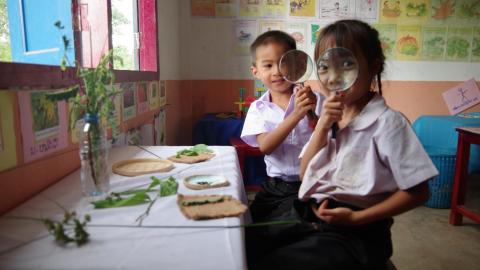
Resources
World Vision has many resources available so you can learn more about our education work. You can view or download any of the resources below:
Education Technical Programming Briefs
- View all our Education Technical Briefs which will provide World Vision's background to the Holistic Learning Approach.
Global Education Brochure
- Educating Children for Life: Core Models and Approaches - An overview of World Vision's life-cycle approach and core models for education children for life.
Early Childhood Development
- Go Baby Go (Ages 0-6) - Find out more about our ECD approach that targets the first 1,000+ days of a child's life and aims to build knowledge, skills, and resilience-promoting techniques to improve parenting practices at the household level.
- Learning Roots (Ages 3-6) - The earliest years of a child’s life are a window of opportunity to support the emergence of literacy, numeracy and life skills that will form the foundation for a lifetime of learning and fulfillment.
- Learning Roots Teacher Training Videos - There are 12 new videos available to illustrate key teaching strategies from the Learning Roots (LR) Teacher Training programme. These videos are designed to enhance understanding and implementation of Learning Through Play (LTP) in Early Childhood Education settings, offering teachers practical demonstrations of how to apply these strategies in the classroom.
- Toy Guide for Early Childhood Development (Ages 0-9) - The booklet includes ideas for engaging young children with toys and games to promote development across four domains: literacy, numeracy, physical, and socio-emotional. The resource is picture-based and suitable for low- /no literacy levels. There are different versions of the booklet to ensure that it is appropriate across multiple cultural contexts. Please review each version to determine which is most reflective of your audience.
- Playful Parenting Activity Booklet (Ages 0-9) - The booklet contains ideas for parents and caregivers to help support their young child's physical, cognitive and social-emotional development into helpful sections based on a young child's developmental milestones. The resource is picture-based and suitable for low- /no literacy levels. There are different versions of the booklet to ensure that it is appropriate across multiple cultural contexts. Please review each version to determine which is most reflective of your audience.
Basic Education
- Learning Roots Learning Through Play Teacher Training Videos - 12 new videos available to illustrate key teaching strategies from the Learning Roots (LR) Teacher Training programme. These videos are designed to enhance understanding and implementation of Learning Through Play (LTP) in Early Childhood Education settings, offering teachers practical demonstrations of how to apply these strategies in the classroom.
- Unlock Literacy (Grades 1-3) - Find out how World Vision has been piloting literacy improvement projects in 25 countries with a focus on unlocking literacy for lifelong learning and outcomes.
- Unlock Literacy Teacher Training Video Modules - World Vision (WV) has created nine award-winning teacher training videos designed to support our Unlock Literacy [1] teacher training programming. The videos aim to “bring to life” elements of teacher instruction to support master trainers and the teachers they train to better see and understand the skill or strategy in a classroom setting. You can view or download all nine video modules here.
- Child Friendly Spaces At Home Activity Cards (Ages 6-17) - World Vision and IFRC Reference Centre for Psychosocial Support launched a Child Friendly Space (CFS) Toolkit in 2017. These activity cards are selected and adapted from the CFS Activity Catalogue. The catalogue promotes child and family psychosocial wellbeing during the Coronavirus pandemic. The activity cards are designed for children 6-17 years of age who are in lock-down or have limited access to school and recreational programming. All of the activities can be done individually or with a small group of 2 to 3 people at home or in any suitable place. The cards can be made available through online or in-person distributions. A simple monitoring and evaluation form is available for measuring the results of the psychosocial support with the activity cards.
Adolescents
- Positive Youth Development - Positive Youth Development (PYD) is a conceptual framework for a multi-sectoral, assets based approach to adolescent and youth development. View the Positive Youth Development Brief
- IMPACT+ Project Model Brief - Adolescence is also a period of growth, opportunity, and engagement. IMPACT+ is World Vision’s evidence-based model that fosters the skills, behaviours, and attitudes necessary for participation in social, civic, and economic life. World Vision has been building evidence of the impact and effectiveness of IMPACT+ since 2014, and it has become our flagship approach for adolescent well-being, building life skills, developmental assets, active citizenship, and peaceful relationships.
- Safe and Nurturing Schools (Ages 11-18) - Schools should be a place where all children feel safe. Find out how World Vision works with partners to create a positive school environment free from violence in all its forms.
Assessment resources
STAR (School-based Test about Reading)
World Vision has created a literacy assessment designed to measure students’ progress in reading as the result of a specific literacy programme. It is intended for use with Grade 3 students enrolled in and attending a structured learning environment to measure a level of minimum proficiency in reading comprehension.
Measuring Evidence of Quality Achieved (MEQA)
MEQA - is a digital coaching & monitoring system designed specifically for the Education project models. View the MEQA Brief
Other special areas of our education work
Local Language Teaching and Learning Materials - Local language teaching and learning materials comprise community generated reading materials, teaching and learning materials made from locally available resources. These materials provide a way for children and their families to access important information, provide a variety of platforms for learning and knowledge sharing, and spaces for community advocacy.
Creating Teaching and Learning Materials - In order to support the development and use of teaching and learning materials, World Vision recognises strength in the confluence of community engagement, capacity building of local stakeholders, and contextualisation and location in order to achieve long term sustainability.